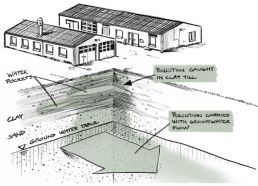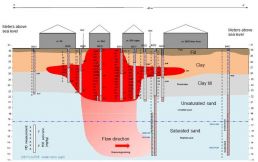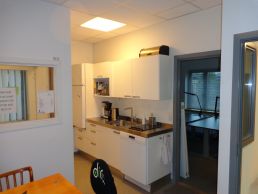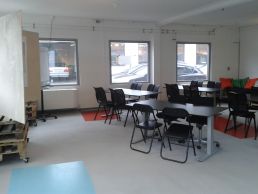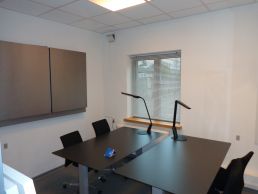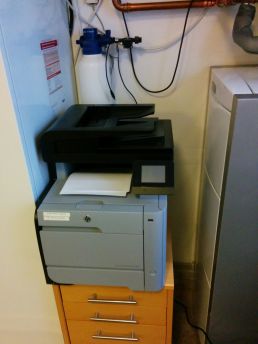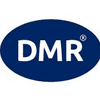Former dry cleaning facility
PCE in clay till and sand aquifer, P&T plant
Meeting room and office spaces.
KONTAKT
Innovation Garage, Skovlunde
Skovlunde Byvej 96A
DK-2740 Skovlunde
Niels Døssing Overheu
Region Hovedstaden
T: 38665563
E: niels.doessing.overheu@regionh.dk
Site owner:
Capital Region of Denmark
PRÆSENTATION AF SITET
BEGRUNDELSE FOR SITET
The site is a former dry cleaning facility heavily contaminated with chlorinated solvents, which was prioritized for an expensive publicly financed remediation. In 2012 the Region saw the opportunity to purchase the site in order to test more cost-effective and sustainable remediation methods without annoying a site owner. In this way, the region hoped to reduce the overall cost of remediating the site while also building up knowledge. Furthermore the buildings at the site could be used for meetings and workshops.
GEOLOGI
Below the fill is 6-8 meters of clay till. The first about three meters of till is soft and moist with sand lenses, while the lower part is compact and dry.
About nine m bgs is a layer of fine, silty sand which continues to about 20 m bgs. The sand layer is unsaturated in the upper five meters. In the deepest well in the area (27 m bgs) the sandy deposits get coarser with depth and are characterized as coarse gravel in the bottom.
The limestone deposits are expected to be found about 27 m bgs, however no boreholes in the vicinity reach the limestone.
FORURENINGSSITUATION
Operation of dry cleaning facilities from 1960-1987 has caused has caused heavy contamination with chlorinated solvents, mainly tetrachloroethylene (PCE). About 2 tons of PCE is expected at the site. In the hot spot below the northern building, high concentrations have been found as far down as 8.5 m bgs, while the overall picture outside the hot spot is vertical diffusion from 2.5 to 4 m bgs.
PCE is by far the most dominant component in the soil. Only small and insignificant quantities of decomposition products, hydrocarbons and BTEX have been found in the soil, compared to the PCE concentrations.
In the secondary groundwater in the clay till from 2–5 m bgs, extensive contamination by PCE, TCE, decomposition components and hydrocarbons have been found.
One well screened in the regional sand aquifer below the till is also contaminated, and high concentrations of degradation products are detected compared to PCE (well no. B203). The high content of decomposition components in relation to PCE in the groundwater is considered evidence of a high degree of natural decomposition in the unsaturated and saturated zone. In 2012 a pumping well screened in the regional sand aquifer was drilled in order to maintain hydraulic control of the leaching contamination during the site’s lifetime as a test site (well no. 200. 6903).
The figures below show a simplified 3D conceptual site model and a north-south cross-section through the hot spot area. More site information and cross-sections (in Danish) can be found in the collection of Technical documents.
PRAKTISK
Adgang til sitet
How to get there and where to park:
Please consult these directions.
Entering the buildings:
The buildings are accessed using a control panel at the main door of the northern building. Inside the door to the left you will find a set of keys to the rest of the entrance doors. Please return the keys to their place before you leave.
Capital Region employees: You can use your chip tag to open the main door just like your regular office.
External partners: Contact the site administrator or our technician Kim Larsen (+45 2033 4722) to get a code, a chip tag or have the door unlocked remotely.
How to book test space and meeting rooms:
Capital Region employees: Send an Outlook meeting request to CRU-FP-Testgrund specifying the space requested, the activity and the expected noise level. See room numbers in Infrastructure for testing below. The booking is confirmed when the administrator accepts the request.
External partners: Talk to your Capital Region contact or the site administrator to make the booking.
Heavy vehicles:
Generally the access conditions for heavy vehicles are good. If any cars are in the way between Skovlunde Byvej and the site, please contact the site administrator or talk to the nice people at Palms Auto (our neighbors to the south). The free space between our two buildings is five meters.
Faciliteter
Two toilets
One with shower.
The toilets are located in the western end of the northern building.
Extra tissue can be found in the storeroom by the kitchen.
Kitchen
Fitted with dishwasher, oven, two hot plates, coffee machine, kettle, fridge/freezer and tableware for about 20.
You are welcome to brew the coffee and tea found in the cabinet. All other food and drinks (besides water) must be brought by yourselves.
Meeting room
Easily fits 25, with a little effort up to 40. The meeting room has a screen, projector and several bulletin boards.
Office
Fits 2-4 people.
Internet
The region’s network is available for wired (northern building) and wireless access (both buildings). Non-region devices can use our open guest network “RegHGaest”. Open an internet browser, type your e-mail address, and log on.
Printer / scanner
There is a network printer in the kitchen. Capital Region PCs can access the printer as STB-RGH-CRU14. External partners can print using the black USB cable hanging behind the printer. Note that the sliders in the paper tray are a little sensitive, so if it complains about wrong paper type, try adjusting the paper tray sliders back to A4 format. The machine can also scan to pdf-format and send the files by e-mail.
Test infrastruktur
How to get there and where to park:
Please consult these directions.
Entering the buildings:
The buildings are accessed using a control panel at the main door of the northern building. Inside the door to the left you will find a set of keys to the rest of the entrance doors. Please return the keys to their place before you leave.
Capital Region employees: You can use your chip tag to open the main door just like your regular office.
External partners: Contact the site administrator or our technician Kim Larsen (+45 2033 4722) to get a code, a chip tag or have the door unlocked remotely.
How to book test space and meeting rooms:
Capital Region employees: Send an Outlook meeting request to CRU-FP-Testgrund specifying the space requested, the activity and the expected noise level. See room numbers in Infrastructure for testing below. The booking is confirmed when the administrator accepts the request.
External partners: Talk to your Capital Region contact or the site administrator to make the booking.
Heavy vehicles:
Generally the access conditions for heavy vehicles are good. If any cars are in the way between Skovlunde Byvej and the site, please contact the site administrator or talk to the nice people at Palms Auto (our neighbors to the south). The free space between our two buildings is five meters.
Krav til projektejere
Visitors:
Generally we ask that you treat the facilities with respect and clean up after yourselves. This includes tidying the kitchen and emptying the dishwasher when it is done. Turning off the lights and locking the doors when you leave. You know the drill. We have service personnel to empty the waste bins and routinely clean the toilets and floors.
Project owners:
If you wish to use the facilities to test a method “on your own” (i.e. the region is not involved in the test), you are welcome to do so. We ask you to sign an agreement, which commits the project owner to take responsibility for any damages under Danish law and for not increasing the cost of future public efforts to remediate the contamination. Here you can find a template for the agreement.
Tekniske dokumenter
- Analysis - Well control parameters (boringskontrol) 04.02.2016
- Conceptual cross-sections (2011)
- Conceptual site model (geology, soil and groundwater) 2018
- Construction examination (2014)
- Data compilation report 2017
- Data sheet for P&T plant
- Directions to the Innovation Garage
- Indoor air - 2015 report
- Indoor air - Aug. 2014 measurements
- Indoor air concentrations and filtration tests 2017
- Piping and Instrumentation (PI) diagram and well drawings
- Report 1998a Jan. - Investigation
- Report 1998b Apr. - Supplementary investigation phase I
- Report 1998c Oct. - Supplementary investigation phase 2
- Report 1998d Dec. - Remediation project proposal
- Report 2000 - Remediation project - Drain and excavation
- Report 2006 - Appendix figures
- Report 2006 - Supplementary investigation and reassessment of remediation facility
- Report 2011 - Investigation
- Report 2015 - P&T plant documentation and operation
- Soil air conc. and ventilation test North building 2017
- Soil air concentrations (plan view) 2005
- Soil air concentrations (south building, plan view) 2014
- Soil concentrations (plan view) 2005
- Stratigraphy and screens - Monitoring wells 2021
- Stratigraphy and screens - Pumping and infiltration well
- Third party agreement template
Igangværende projekter
Understanding transport to indoor air, contaminated building materials and mitigation of vapor intrusion
Contaminated building materials: Testing of methods for estimating contaminant content in building materials and flux from these to the indoor air.
Effective Sub-slab depressurization: Testing the robustness of a sub-slab depressurization system in mitigating vapor transport across the concrete floor, via cavity walls and sewers.
Using pump-and-treat plants for energy production and storage
Heat pump:
The Innovation Garage has a demonstration facility to evaluate the potential of exploiting the extracted groundwater in the P&T plant for heating and cooling purposes. The P&T plant is fitted with a heat exchanger connected to a heat pump which extracts 3-5 degrees C from the groundwater which is used for room heating. Furthermore, an airconditioning unit in Room 6 uses the groundwater as a coolant. Combined heating and cooling increases the efficiency of the heat pump.
Contact: Line Mørkebjerg Fischer.
Aquifer Thermal Energy Storage (ATES):
A project group based in the Operation & Maintenance team explore the possibilites of using P&T plants for ATES.
Contact: Anne Mette Granhøj Hansen

